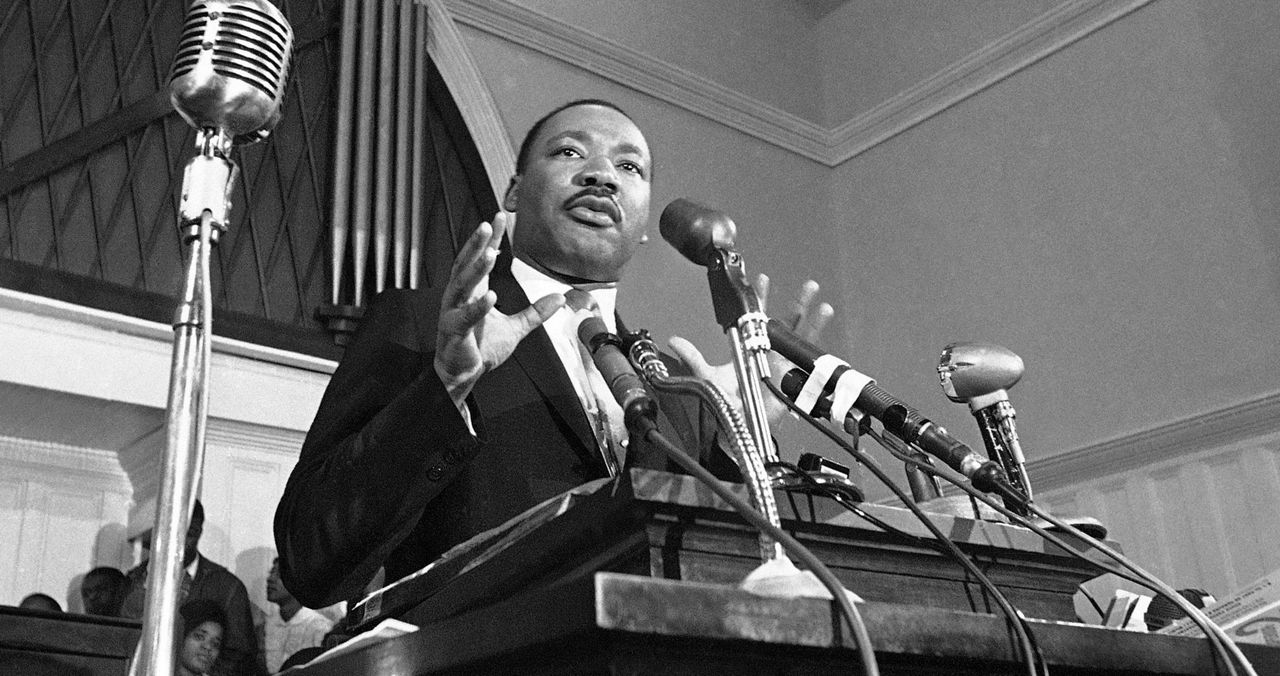CINCINNATI — Cities across the United States plan to host tributes and celebrations on Monday to recognize the life’s work and lasting legacy of Dr. Martin Luther King Jr.
Cincinnati is no different. There are marches, cultural events, lectures and performances taking place in various corners of the Queen City, a place MLK visited several times during his life.
But for Paul Booth, the King isn’t just something to honor one day a year every January. It’s something everyone should try to emulate every day.
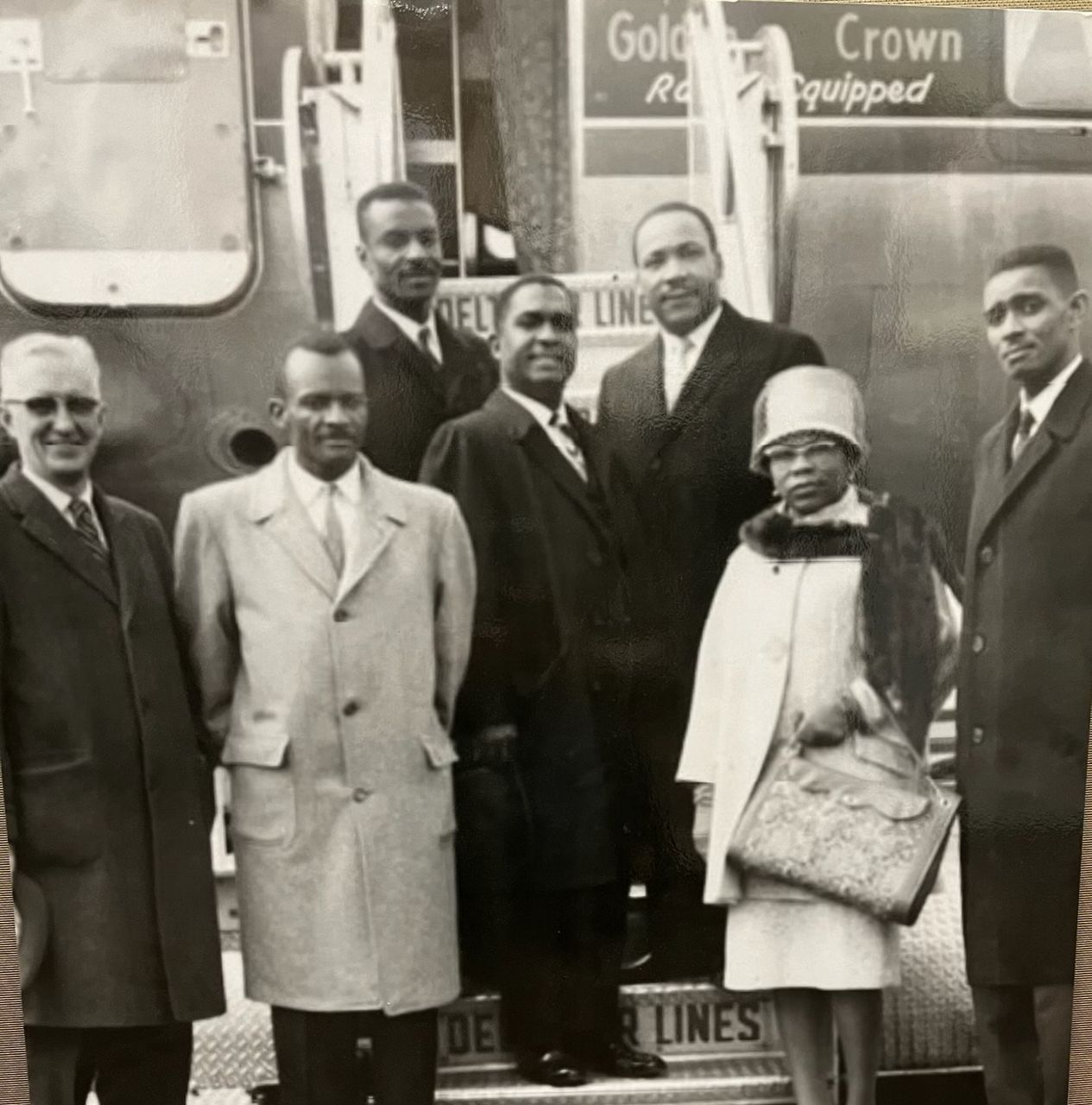
Booth, head of Cincinnati’s Office of Human Relations, had the chance to meet King when he was 10 years old.
Booth’s father, the Rev. L.V. Booth, was a colleague of King, who was also a Baptist minister. He invited King to visit Cincinnati on occasion to preach at Zion Baptist Church in Avondale. Booth’s father was the pastor.
The younger Booth had the “honor and privilege” of meeting King on one of those occasions in Nov. 1964.
King spoke twice at the church twice that day, according to Booth. He remembered him first speaking to the young people in the neighborhood, and then to the entire congregation.
Later that evening, King and Andrew Young, Jr., a close confidant to King, made a somewhat unexpected stop at the Booth household in Avondale on the way to the airport.
Young, 90, later served in Congress, as an ambassador to the United Nations and as mayor of Atlanta.
“They stopped by our home, perhaps on the way to the airport, and I had a chance to meet him to talk to him for a little bit and get his autograph,” Booth said.
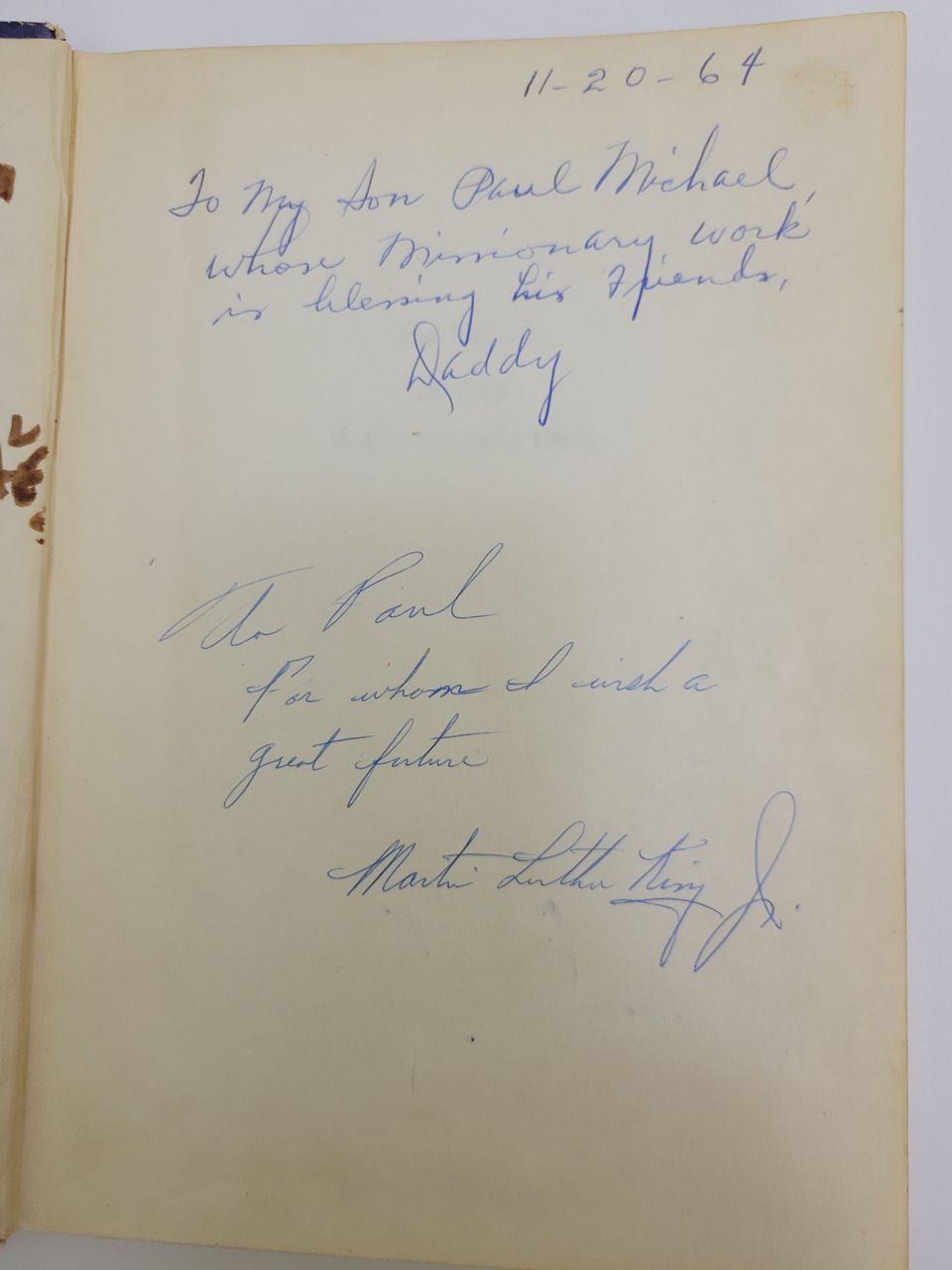
He found a piece of scrap paper for King to sign, but his father didn’t think that was quite good enough, the 68-year-old recalled with a chuckle.
His father instead gave him a children's book about the life of Jesus Christ for the civil rights icon to sign.
King signed the inside of the book, “To Paul, to whom I wish a great future.”
To this day, Booth keeps that book in his office at City Hall.
“Although I was very young at the time, that meeting began a real love affair with all the things that Dr. King represented,” he said.
That encounter led Booth to attend Morehouse College in Atlanta, where King went to school. He also joined the same fraternity as his childhood idol. When he got older, he and his wife Cynthia named their second son Martin.
It also inspired him to pursue a career in politics.
“Dr. King just had a tremendous, tremendous and lasting effect on my life and the work that I do today,” Booth said.
A life inspired by MLK
Booth received an appointment to Cincinnati City Council in 1989, and voters later elected him to office from 1998 to 2003.
He’s also a former commissioner of the Cincinnati Human Relations Commission, which for decades sought to improve race relations in the city. It also served as a sort of support incubator for Appalachians, women, persons with disabilities and the LGBTQ+ community, Booth said.
The commission became the Office of Human Relations, a city department, in Nov. 2016, a few months before Booth took over the reins.
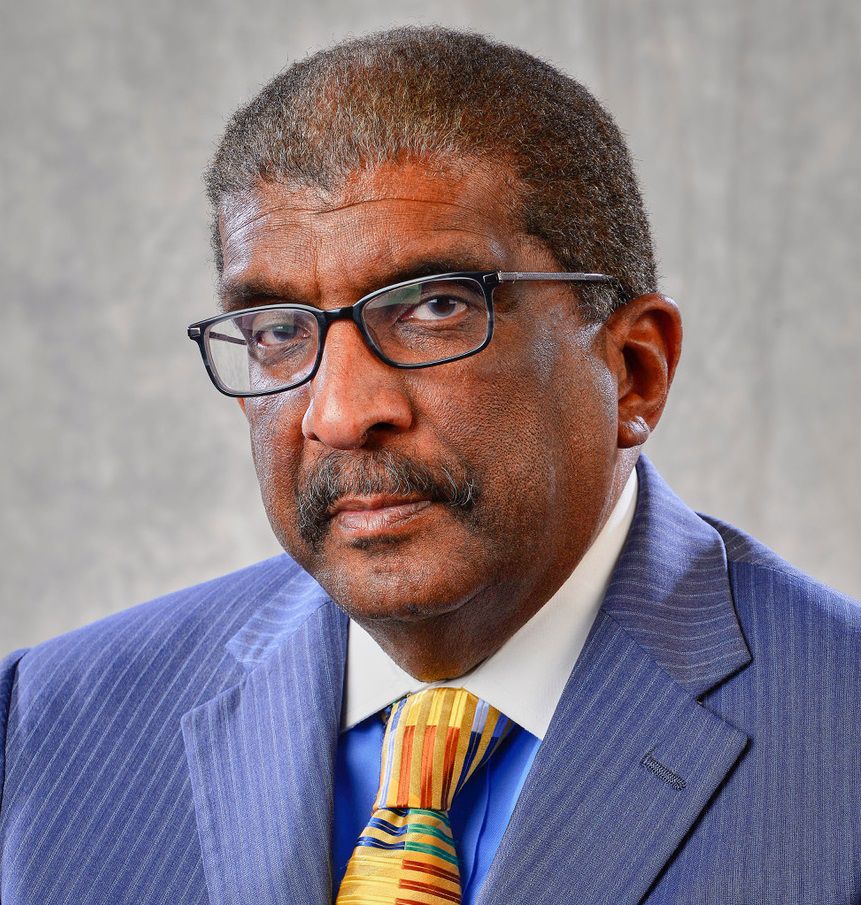
In his current role, Booth and his team deal with issues of equity, justice and diversity, particularly as it relates city dealings and issues within Cincinnati.
Sometimes, that’s hosting educational sessions or supporting cultural events. In other instances, it’s tackling challenging issues such as promoting equality in the workplace.
As part of his job, Booth is playing a role in the creation of a new MLK memorial. The city is still in the planning stages, Booth said. But they’ll put it at the corner of Martin Luther King Jr. Drive and Reading Road, not far from where Booth grew up.
The Office of Human Relations also plays a role in strengthening relationships between various community groups and the city government, Booth said.
“That’s what Dr. King was all about,” he added. “He stood for all people, no matter the color of their skin or where they live. And in this role, we work to assist the city, mainly city employees, to ensure they’re receiving equitable treatment, and that the city itself truly embraces diversity and equity.”
About five years ago, Booth received an appointment to the Ohio Dr. Martin Luther King, Jr. Holiday Commission. The statewide advocacy group promotes King’s legacy, especially his principles of nonviolence and service to others, throughout the entire year through various events. Particular attention is paid to the holiday recognizing his honor each January.
Established in 1985, the commission presents awards annually honoring the achievements of Ohio residents and organizations who exemplify King’s commitment to seeking racial, social, and economic justice.
Booth was in Columbus on Jan. 12 to help award the honorees during the annual MLK Commemorative Celebration at Trinity Episcopal Church.
Celebrating King’s life and carrying on his mission
On Monday, Booth plans to be in Atlanta to take part in a national MLK celebration hosted by the Martin Luther King, Jr. Center For Nonviolent Social Change, or The King Center. Its CEO is Dr. Bernice A. King, MLK’s daughter.
While Booth won’t be in Cincinnati, there are a variety of local events aimed at honoring King’s life and legacy.
One of those events is the King Legacy Celebration at the National Underground Railroad Freedom Center.
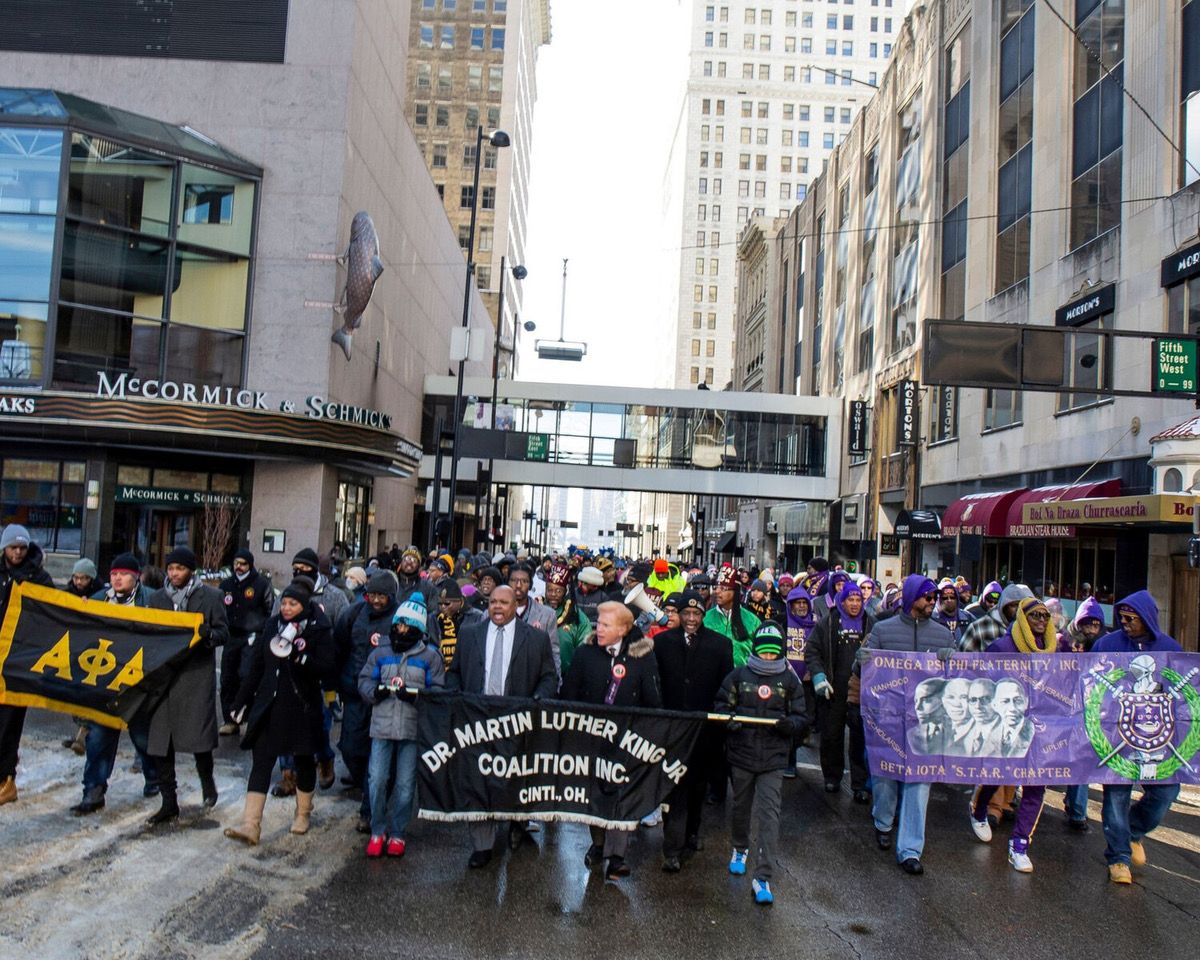
One of the signature elements of the day is a discussion with Brittany Packnett Cunningham, a social activist and educator whose writing focused on the intersection of culture and justice. The goal of her, according to her bio, is to “activate everyday people to take transformative action for justice.”
There are also plans for dance and musical tributes to MLK, including a performance by Cincinnati Symphony Orchestra Quartet.
“The event is first a celebration of Dr. King’s enduring legacy, but it’s also an opportunity for reflection as we as we look to continue to work toward fulfilling his dream,” said Eric Newsom, the museum’s vice president of philanthropy.
Newsom’s reference to King’s dream was a reference to the famous “I Have a Dream” speech King delivered during the March on Washington in 1963.
“Our mission at the Freedom Center is to continue the pursuit of inclusive freedom for all. And what we look to do is to respond to Dr. King’s call to action and recognize that so much work still needs to be done as it relates to social and economic justice even 55 years after (King’s) death,” Newsom said.
Just outside the Freedom Center, a group of residents will join political, religious and social justice leaders at 10:30 a.m. for an interdenominational prayer service.
They’ll then embark on a roughly 1-mile trek to Washington Park in Over-the-Rhine.
Booth, who’s taken part in the MLK Coalition’s annual walk a number of times over the years, described it as a” symbolic re-enactment of civil rights era marches.”
After another prayer session at the park, the group will then head across Elm Street to Music Hall at noon for speakers and musical performances, including a performance by the MLK Chorale.
The MLK Day performances and celebrations are an important aspect of commemorating King’s legacy, Booth said. But just as important, he believes, is passing down information about the civil rights leader to inspire the next generation of 10-year-olds to carry on his mission.
“Dr. King dedicated his life to making this world a better place for all people. As we honor that life on Monday, we should also view it as a call to action to do our part as well,” he added.



